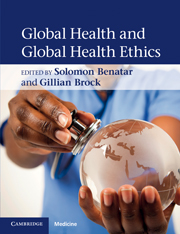Book contents
- Frontmatter
- Contents
- List of contributors
- Introduction
- Section 1 Global health, definitions and descriptions
- Section 2 Global health ethics, responsibilities and justice: some central issues
- Section 3 Analyzing some reasons for poor health
- 12 Trade and health: the ethics of global rights, regulation and redistribution
- 13 Debt, structural adjustment and health
- 14 The international arms trade and global health
- 15 Allocating resources in humanitarian medicine
- 16 International aid and global health
- 17 Climate change and health: risks and inequities
- 18 Animals, the environment and global health
- 19 The global crisis and global health
- Section 4 Shaping the future
- Index
- References
15 - Allocating resources in humanitarian medicine
Published online by Cambridge University Press: 01 March 2011
- Frontmatter
- Contents
- List of contributors
- Introduction
- Section 1 Global health, definitions and descriptions
- Section 2 Global health ethics, responsibilities and justice: some central issues
- Section 3 Analyzing some reasons for poor health
- 12 Trade and health: the ethics of global rights, regulation and redistribution
- 13 Debt, structural adjustment and health
- 14 The international arms trade and global health
- 15 Allocating resources in humanitarian medicine
- 16 International aid and global health
- 17 Climate change and health: risks and inequities
- 18 Animals, the environment and global health
- 19 The global crisis and global health
- Section 4 Shaping the future
- Index
- References
Summary
Background
Allocating resources in humanitarian medicine is a vitally important and cruelly difficult exercise. In the huge disconnect between severe human needs and limited resources, even asking how allocation can be fair can seem harsh. Do those involved in humanitarian medicine not simply do all they can?
Daunting as the questions regarding how to allocate resources fairly and legitimately in humanitarian medicine may be, they are gaining in importance for at least three identifiable and related reasons.
First, one of the primary motivating factors for humanitarian medicine is the rule of rescue, “the imperative people feel to rescue identifiable individuals facing avoidable death,” or other plights invoking a shock or horror reaction, “without thinking about the costs too much” (Jonsen, 1986; McKie & Richardson, 2003). As humanitarian medicine successfully raises awareness of urgent health-related needs in poverty-stricken regions of the world, the number of such identifiable victims increases. Indeed, we should expect identified needs to remain greater than the available means as long as there are both pressingly needy sick persons, and advocates raising awareness to their plight. One usual implication of the rule of rescue is that an identifiable, immediate victim should have priority over distant “statistical” lives. From the perspective of a humanitarian organization, persons in need are indeed identifiable, and giving aid to them is saving real, not “statistical” lives. As the number of such identifiable victims, and the diversity of their needs, increase, so does the complexity of allocation decisions.
- Type
- Chapter
- Information
- Global Health and Global Health Ethics , pp. 173 - 183Publisher: Cambridge University PressPrint publication year: 2011

